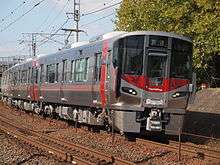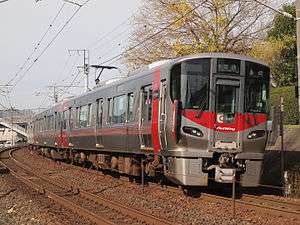227 series
| 227 series | |
|---|---|
|
3-car set A03 in November 2015 | |
| In service | 14 March 2015 - |
| Manufacturer | Kawasaki Heavy Industries, Kinki Sharyo |
| Built at | Hyogo and Osaka |
| Family name | Red Wing |
| Replaced | 103 series, 115 series |
| Constructed | 2014–2018 |
| Number under construction | 250 vehicles (97 sets) |
| Number built | 26 vehicles (9 sets) |
| Formation | 2/3 cars per trainset |
| Operator(s) | JR-West |
| Depot(s) | Hiroshima |
| Line(s) served | Sanyo Main Line, Kabe Line, Kure Line |
| Specifications | |
| Car body construction | Stainless steel |
| Car length |
19,570 mm (64 ft 2 in) (end cars) 19,500 mm (64 ft 0 in) (intermediate cars) |
| Width | 2,950 mm (9 ft 8 in) |
| Height | 3,630 mm (11 ft 11 in) |
| Floor height | 1,120 mm (3 ft 8 in) |
| Doors | 3 pairs per side |
| Maximum speed |
110 km/h (70 mph) (Service) 120 km/h (75 mph) (Design) |
| Traction system | IGBT-VVVF |
| Acceleration | 2.5 km/h/s |
| Deceleration | 3.9 km/h/s |
| Electric system(s) | 1,500 V DC |
| Current collection method | Overhead catenary |
| Safety system(s) | ATS-DW |
| Track gauge | 1,067 mm (3 ft 6 in) |
The 227 series (227系 227-kei) is a DC electric multiple unit (EMU) train operated by West Japan Railway Company (JR-West) for use on suburban services in the Hiroshima area of Japan since 14 March 2015.[1][2][3]
Design
The trains have unpainted stainless steel bodies, with an exterior livery featuring red highlights.[4] Each motored car has one motored bogie.[4] The trains will be branded "Red Wing", with logos applied to the body sides and to the prominent anti-fall plates on the front ends, which inspired the name.[5]
Operations
The 227 series trains were delivered from autumn 2014 for test running and driver training before entering revenue service initially on the Sanyo Main Line between Shiraichi and Iwakuni, replacing ageing JNR-era 115 series EMUs.[1] The trains will also displace 115 series EMUs on the Kure Line and Kabe Line, with the entire fleet of 276 vehicles (106 sets) scheduled to be delivered by the end of fiscal 2018.[2]
Formations
The 227 series fleet on order consists of 42 two-car and 64 three-car sets, allowing formations of up to eight cars to be formed in service.[4]
3-car sets
The three-car sets are numbered A01 onward, and are formed as shown below with all three cars motored (one motored bogie per car).[6]
| Designation | Mc | M | M'c |
|---|---|---|---|
| Numbering | KuMoHa 227 | MoHa 226 | KuMoHa 226 |
| Weight (t) | 40.2 | 37.1 | 40.5-40.6 |
| Capacity (total/seated) | 133/56 | 149/72 | 126/52 |
- The seating capacity figures above include 12 flip-down seats in the end cars and 16 in the intermediate cars.[6]
- The KuMoHa 227 car is fitted with a WPS28E single-arm pantograph.[6]
- The KuMoHa 226 car has a universal access toilet.[6]
-

KuMoHa 227-12
-

MoHa 226-12
-

KuMoHa 226-12
2-car sets

The two-car sets are numbered S01 onward, and are formed as shown below with both cars motored (one motored bogie per car).[6]
| Designation | Mc | M'c |
|---|---|---|
| Numbering | KuMoHa 227 | KuMoHa 226 |
| Weight (t) | 40.2 | 40.5-40.6 |
| Capacity (total/seated) | 133/56 | 126/52 |
- The seating capacity figures above include 12 flip-down seats in each car.[6]
- The KuMoHa 227 car is fitted with a WPS28E single-arm pantograph.[6]
- The KuMoHa 226 car has a universal access toilet.[6]
Interior
The passenger saloons use LED lighting, and the trains are equipped with universal access toilets and wheelchair spaces.[2] Passenger accommodation consists of transverse seating with flip-over seat backs, and longitudinal bench seating at the ends of cars.[4] Flip-down seats are also provided next to the doorways.[6]
-
A view of the transverse flip-over seating, January 2015
-
The wheelchair space at the end of a KuMoHa 227 car
History
The first three-car set, numbered A03, was delivered to Hiroshima Depot in September 2014 from the Kawasaki Heavy Industries factory in Hyogo.[7] Sets A01 and A02 were delivered to Hiroshima Depot from Kinki Sharyo in October 2014.[8] The first two car set, numbered S01, was delivered from Kawasaki Heavy Industries in January 2015 together with three-car set A06.[9]
Build details
3-car sets
| Set No. | Manufacturer | Date delivered |
|---|---|---|
| A01 | Kinki Sharyo | 7 October 2014[10] |
| A02 | Kinki Sharyo | 7 October 2014[10] |
| A03 | Kawasaki Heavy Industries | 2 October 2014[10] |
| A04 | Kinki Sharyo | January 2015[11] |
| A05 | Kinki Sharyo | January 2015[11] |
| A06 | Kawasaki Heavy Industries | January 2015[9] |
| A07 | Kinki Sharyo | February 2015[12] |
| A08 | Kinki Sharyo | February 2015[12] |
| A09 | Kawasaki Heavy Industries | February 2015[12] |
| A10 | ||
| A11 | ||
| A12 | ||
| A13 | ||
| A14 | ||
| A15 | ||
| A16 | Kawasaki Heavy Industries | April 2015[13] |
| A17 | ||
| A18 | ||
| A19 | ||
| A20 | ||
| A21 | ||
| A22 | ||
| A23 | ||
| A24 | ||
| A25 | ||
| A26 | ||
| A27 | ||
| A28 | ||
| A29 | ||
| A30 |
2-car sets
| Set No. | Manufacturer | Date delivered |
|---|---|---|
| S01 | Kawasaki Heavy Industries | January 2015[9] |
| S02 | Kawasaki Heavy Industries | February 2015[12] |
| S03 | Kawasaki Heavy Industries | April 2015[13] |
| S04 | ||
| S05 | ||
| S06 | ||
| S07 | ||
| S08 | ||
| S09 | ||
| S10 | ||
| S11 | ||
| S12 | ||
| S13 | ||
| S14 | ||
| S15 | ||
| S16 | ||
| S17 | ||
| S18 | ||
| S19 | ||
| S20 | ||
| S21 | ||
| S22 | ||
| S23 | ||
| S24 | ||
| S25 | ||
| S26 | ||
| S27 | ||
| S28 | ||
| S29 | ||
| S30 |
References
- 1 2 Yamamoto, Koji (15 June 2014). JR西が三十数年ぶり新型電車 [New trains from JR-West for first time in over 30 years]. Chugoku Shimbun Alpha (in Japanese). Japan: The Chugoku Shimbun. Retrieved 19 June 2014. (registration required)
- 1 2 3 "JR西日本、広島地区に227系近郊形直流電車を投入" [JR-West to introduce 227 series DC suburban trains in Hiroshima area]. The Page (in Japanese). Japan: Wordleaf Corporation. 19 June 2014. Retrieved 19 June 2014.
- ↑ 平成27年春のダイヤ改正について [Spring 2015 timetable revision details] (PDF). News release (Press release) (in Japanese). West Japan Railway Company, Hiroshima Division. 19 December 2014. p. 8. Retrieved 9 March 2015.
- 1 2 3 4 227系近郊形直流電車 [227 series suburban DC EMU]. Japan Railfan Magazine (in Japanese). Japan: Koyusha Co., Ltd. 54 (644): 58–60. December 2014.
- ↑ JR西日本 227系に車輌愛称名導入 [JR-West to introduce brand name for 227 series]. Tetsudo Hobidas (in Japanese). Japan: Neko Publishing Co., Ltd. 6 March 2015. Retrieved 6 March 2015.
- 1 2 3 4 5 6 7 8 9 227系近郊形直流電車 [227 series suburban DC EMU]. Japan Railfan Magazine (in Japanese). Japan: Koyusha Co., Ltd. 55 (647): 61–64. March 2015.
- ↑ "227系A03編成が川崎重工から出場" [227 series set A03 delivered from Kawasaki Heavy Industries]. Japan Railfan Magazine Online (in Japanese). Japan: Koyusha Co., Ltd. 29 September 2014. Retrieved 30 September 2014.
- ↑ "227系A01・A02編成が近畿車輌から出場" [227 series sets A01 and A02 delivered from Kinki Sharyo]. Japan Railfan Magazine Online (in Japanese). Japan: Koyusha Co., Ltd. 7 October 2014. Retrieved 7 October 2014.
- 1 2 3 川崎重工から227系A06編成+S01編成が出場 [227 series sets A06 and S01 delivered from Kawasaki Heavy Industries]. Japan Railfan Magazine Online (in Japanese). Japan: Koyusha Co., Ltd. 31 January 2015. Retrieved 31 January 2015.
- 1 2 3 JR車両のうごき [JR rolling stock changes]. Tetsudō Daiya Jōhō Magazine (in Japanese). Japan: Kōtsū Shimbun. 44 (371): 127. March 2015.
- 1 2 近畿車輛から227系A04編成+A05編成が出場 [227 series sets A04 & A05 delivered from Kinki Sharyo]. Japan Railfan Magazine Online (in Japanese). Japan: Koyusha Co., Ltd. 23 January 2015. Retrieved 23 January 2015.
- 1 2 3 4 227系A09編成+S02編成が出場 [227 series sets A09 & S02 delivered]. Japan Railfan Magazine Online (in Japanese). Japan: Koyusha Co., Ltd. 25 February 2015. Retrieved 25 February 2015.
- 1 2 227系A16編成+S03編成が出場 [227 series sets A16 & S03 delivered]. Japan Railfan Magazine Online (in Japanese). Japan: Koyusha Co., Ltd. 26 April 2015. Retrieved 27 April 2015.
External links
| Wikimedia Commons has media related to 227 series. |
- JR-West press release (19 June 2014) (Japanese)

